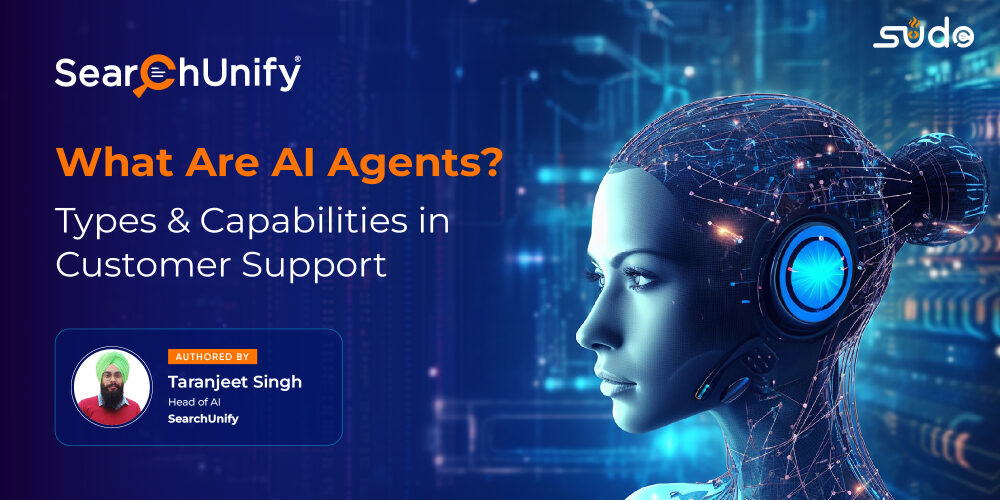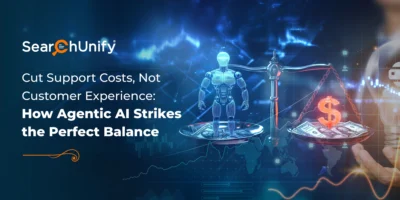
2025 is going to be the year of AI agents! Thinking, why?
The transformative power of AI is reaching a tipping point. Earlier, enterprises were eager to leverage GenAI in customer support. However, the attention has now shifted from AI tools to implementing AI agents.
So, the question arises: What exactly are AI agents, and what capabilities do they possess? How are they helping to reshape the customer support industry?
This blog explains the types of AI agents and how they enhance customer experience. So, let’s dive in!
What is an AI Agent?
An AI agent is a system that interacts with its environment, makes decisions using AI models like LLMs, and performs specific tasks autonomously. These models analyze the data and take the required actions to achieve a certain task.
AI agents have significantly evolved from simple rule-based bots to autonomous agents, exhibiting natural language processing (NLP) capabilities. This evolution enables them to perform various tasks, such as automatically generating and curating knowledge base content to improve self-service.
Additionally, AI agents’ ability to learn and adapt continuously makes them indispensable in meeting customers’ evolving demands in the support industry.
Different Types of AI Agents and Their Impact on Transforming Customer Support
Let’s explore the list of different types of AI agents:

Reactive Agents
Reactive agents are basic-level agents that follow pre-defined rules to react and respond to specific inputs. They can automate repetitive tasks, reducing manual effort.
So, what kind of AI agents can we put in the reactive agent category?
Different AI agents fit into various use cases within the customer support workflow.
For instance, the auto-generation agent, powered by Agentic AI and LLMs, generates initial responses to customer cases by interpreting case fields and information sources. It not only ensures prompt replies but also reduces customers’ wait time and enhances their overall customer experience.
Additionally, it saves support agents time and allows them to focus on more strategic tasks.
Task-Specialized Agents
Task-specialized agents are designed to perform specific tasks, often excelling beyond human ability. These agents are key pillars of many modern AI-powered support solutions.
Imagine a customer searching for “my Bluetooth is not working” and finding inaccurate, incomplete, or outdated content only. What result would you expect? Frustration, right?
The knowledge creation agent automatically generates and curates knowledge articles, updating the knowledge base to address users’ queries. It saves support agents from time-consuming manual article writing.
This agent enables auto-generating titles & case summaries to capture knowledge within your workflow and turn case information into a well-organized knowledge article using pre-built templates.
Context-Aware Agents
Context awareness agents can handle ambiguity and various types of complex user inputs. They are powered by machine learning and natural language processing.
These agents assess historical data, real-time streams, and unstructured information to identify patterns, then learn and respond intelligently, even in dynamic scenarios. While most AI agents are context-aware, the level of awareness can vary. Without context awareness, AI agents cannot function effectively.
Sophisticated examples include a solution that analyzes massive data to assist customers in resolving their queries. The conversational agent here recognizes the intent of the user query and delivers contextually accurate and natural conversational experience.
But what if the user is unsatisfied with the experience? In that instance, the case creation agent interprets user intent, pre-populates forms with relevant information, and streamlines case creation. This reduces customer effort and ensures faster resolution times.
Socially Savvy Agents
Socially savvy agents have emotional intelligence capabilities, comprehending and interpreting human emotions and intentions, enabling more natural interaction.
For instance, the sentiment analyzer agent, fueled by Agentic AI, gives a comprehensive sentiment score for incoming tickets. This agent extensively analyzes the hidden context and emotion behind customer queries and interprets distinct sentiments such as happiness, sadness, trust, anger, and more.
The score enables support agents to resolve critical cases before they escalate, ensuring a more personalized and effective customer experience.
Self-Reflective Agents
These are futuristic agents that would have the capability to self-reflect on their decisions and refine their algorithms autonomously. It is like we humans look back on our past actions to improve ourselves.
These agents will have the potential to completely transform business operations by continuously changing strategies (not just processes), and that’s without human input.
Future of AI Agents in Customer Support
The future of AI agents in customer support is shifting toward greater autonomy and proactive engagement. With Agentic AI, these systems will enhance decision-making, optimize workflows, and deliver seamless experiences.
As businesses aim for faster, more efficient support, autonomous AI agents will be key to reducing operational burdens and improving satisfaction. Adopting this shift isn’t just an advantage—it’s a necessity to stay competitive.













